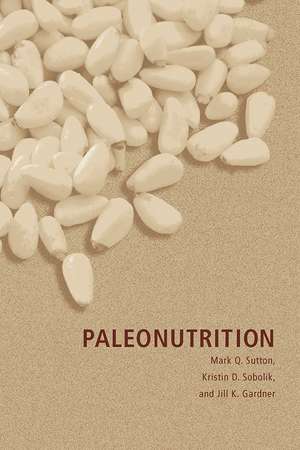Paleonutrition
Autor Mark Q. Sutton, Kristin D. Sobolik, Jill K. Gardneren Limba Engleză Hardback – 15 apr 2010
Paleonutrition is the analysis of prehistoric human diets and the interpretation of dietary intake in relation to health and nutrition. As a field of study, it addresses prehistoric diets in order to determine the biological and cultural implications for individuals as well as for entire populations, placing archaeological interpretations into an anthropological context. Throughout history, and long before written records, human culture has been constantly in flux. The study of paleonutrition provides valuable insights into shifts and changes in human history, whatever their causes.
This is the most comprehensive and up-to-date book on the topic. Intended for students and professionals, it describes the nature of paleonutrition studies, reviews the history of paleonutrition research, discusses methodological issues in the reconstruction of prehistoric diets, presents theoretical frameworks frequently used in paleonutrition research, and showcases examples in which paleonutritional analyses have been successfully conducted on prehistoric individuals, groups, and populations. It offers an integrative approach to understanding state-of-the-art anthropological dietary, health, and nutritional assessments. The most recent and innovative methods used to reconstruct prehistoric diets are discussed, along with the major ways in which paleonutrition data are recovered, analyzed, and interpreted.
Paleonutrition includes five contemporary case studies that provide useful models of how to conduct paleonutrition research. Topics range from ancient diets in medieval Nubia to children’s health in the prehistoric American Southwest to honey use by an ethnographic group of East African foragers. As well as providing interesting examples of applying paleonutrition techniques, these case studies illustrate the mutually beneficial linkages between ethnography and archaeology.
This is the most comprehensive and up-to-date book on the topic. Intended for students and professionals, it describes the nature of paleonutrition studies, reviews the history of paleonutrition research, discusses methodological issues in the reconstruction of prehistoric diets, presents theoretical frameworks frequently used in paleonutrition research, and showcases examples in which paleonutritional analyses have been successfully conducted on prehistoric individuals, groups, and populations. It offers an integrative approach to understanding state-of-the-art anthropological dietary, health, and nutritional assessments. The most recent and innovative methods used to reconstruct prehistoric diets are discussed, along with the major ways in which paleonutrition data are recovered, analyzed, and interpreted.
Paleonutrition includes five contemporary case studies that provide useful models of how to conduct paleonutrition research. Topics range from ancient diets in medieval Nubia to children’s health in the prehistoric American Southwest to honey use by an ethnographic group of East African foragers. As well as providing interesting examples of applying paleonutrition techniques, these case studies illustrate the mutually beneficial linkages between ethnography and archaeology.
Preț: 528.27 lei
Preț vechi: 740.99 lei
-29% Nou
Puncte Express: 792
Preț estimativ în valută:
101.12€ • 109.87$ • 84.99£
101.12€ • 109.87$ • 84.99£
Carte indisponibilă temporar
Doresc să fiu notificat când acest titlu va fi disponibil:
Se trimite...
Preluare comenzi: 021 569.72.76
Specificații
ISBN-13: 9780816527946
ISBN-10: 0816527946
Pagini: 384
Dimensiuni: 152 x 229 x 28 mm
Greutate: 0.63 kg
Ediția:New.
Editura: University of Arizona Press
Colecția University of Arizona Press
ISBN-10: 0816527946
Pagini: 384
Dimensiuni: 152 x 229 x 28 mm
Greutate: 0.63 kg
Ediția:New.
Editura: University of Arizona Press
Colecția University of Arizona Press
Notă biografică
Mark Q. Sutton is an emeritus professor of anthropology at California State University, Bakersfield, where he taught for twenty years. He is currently the director of the San Diego office of Statistical Research, Inc. Kristin D. Sobolik is chair of the Department of Anthropology and Associate Director of the Climate Change Institute at the University of Maine in Orono. Jill K. Gardner is the principal investigator for ASM Affiliates, Inc., in Carlsbad, California.
Cuprins
List of Illustrations
Acknowledgments
1 Introduction
2 The Paleonutrition Data Base: Direct Data
3 The Paleonutrition Data Base: Indirect Data
4 Issues in the Recovery of Paleonutritional Data
5 Interpretation and Integration
6 Case Studies
Referencess
Index
Acknowledgments
1 Introduction
2 The Paleonutrition Data Base: Direct Data
3 The Paleonutrition Data Base: Indirect Data
4 Issues in the Recovery of Paleonutritional Data
5 Interpretation and Integration
6 Case Studies
Referencess
Index
Recenzii
“This is a substantial text that combines background to paleonutrition, an extensive bibliography, a discussion on methods, and case studies.”—Sharyn Jones, author of Food and Gender in Fiji: Ethnoarchaeological Explorations
Descriere
The study of paleonutrition provides valuable insights into shifts and changes in human history. This is the most comprehensive book on the topic. Intended for students and professionals, it describes the nature of paleonutrition studies, reviews the history of research, discusses methodological issues in the reconstruction of prehistoric diets, presents theoretical frameworks frequently used in research, and showcases examples in which analyses have been successfully conducted on prehistoric individuals, groups, and populations. It offers an integrative approach to understanding state-of-the-art anthropological dietary, health, and nutritional assessments. The most recent and innovative methods used to reconstruct prehistoric diets are discussed, along with the major ways in which paleonutrition data are recovered, analyzed, and interpreted. The book includes five contemporary case studies that illustrate the mutually beneficial linkages between ethnography and archaeology.
